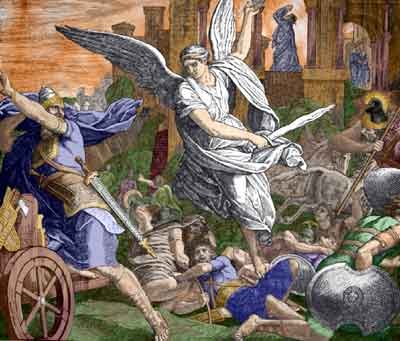
Four hundred and thirty years. Forty years. Seventy years. Four hundred years. When we read through the Bible, it’s easy to skim past those time periods and just read the next chapter of the story, but those years were filled with generations of God’s people trying to live according to His will. They are short words, but long periods of time.
It was four hundred and thirty years between Joseph and Moses. Jacob’s descendants had no written scriptures, no prophecies, a lifetime of slavery ahead of them, and a legend of a God who made a covenant with their great, great, great, great (lots of greats) grandfather. After the Exodus, for forty years, Jacob’s people wandered in the wilderness fortified only by the word of Moses and the wonders they had seen this God do – no Holy books, no deep religious traditions, no prophecies.
A thousand years later, the people of Judah (all that was left of God’s people) were taken into exile for seventy years. And then when they returned there were 400 years of God’s people living for the first time since the Exodus with silence from God, under the boot of the hated Romans, looking for the promised Messiah.
These are only a few of the periods that the Bible doesn’t give an account of where we’re not told of great heroes or great villains, we’re just told that God’s people had to wait.
We’re not told what life was like before the new pharaoh made the Israelites his slaves, other than that the old pharaoh had put them up in the best land in Egypt. Did they stage protests when this change took place? Did they have #HebrewLivesMatter yard signs?
Babylon too was enticing enough that many of the Hebrews chose to stay there rather than returning to their homeland. Esther and Mordecai and Nehemiah were well connected in the Persian courts as Daniel, Shadrach, Meshach, and Abednego were under the preceding regime. How did the Jews decide whether to stay or leave? Should they return to their homeland or stay in Persia and work for its benefit? Did they host debates? Print flyers? Donate to grants and foundations?
We’re not told, and so we turn the page, half a second for us – decades and centuries and generation after generation for them.
That is how history continues after the times of the Bible, as well. We break things into “Ages” or “Periods” when we study history, and convert a thousand years into a one inch segment on a timeline. Our eyes glaze over statistics and dates and death tolls, memorizing data points so we can get good grades and go to college to study computer science.
In the 1300s, the Black Plague wiped out between a third and a half of the population of Europe. If you were alive, about half the people you had grown up with were not. In the American Civil War, 620,000 men were killed – for today’s population that would be as if 6 million of our fathers and brothers had killed each other. Of course, the upheaval surrounding the World Wars as well as the actual fighting gave up casualties in a number never imagined before: 70 to 80 million.
If we don’t think people were saying “this must be the end,” during the Black Death or the World Wars, or after the fall of Rome, or any number of other horrible periods of transition in history, we’re mistaken. But what God has always told His people is not to look at their circumstances, but to look at His promises. And God has always been faithful to care for His people, even after He’s let things get really bad.
Of the many, many times in His Word that God shows His power in miraculously changing the course of history for the good of His people, my mind goes to the story of Hezekiah and Sennacherib.
Found in Isaiah 37, the word of God tells us how Sennacherib’s mighty army was encamped against the walls of Jerusalem, and the Assyrian king sends his emissary to mock Israel for putting their trust in God. Think of Israel’s scouts reporting the conquests of the Assyrian nation, and then reporting that that army is headed this way. They’ve pillaged this town, and then the next. Survivors stream into the gates of Jerusalem. How long will the walls hold? How long can we feed all these extra people? Then Hezekiah humbled himself and trusted God with the future of His people. The next morning 185,000 Assyrian corpses lay outside the gates of the city and Sennacherib and the rest of his army were gone.
This is still the God we serve. He is not stymied by our little black dots on a ballot or by the corruption of those who count them.
When we look back at the tapestry of history we can seen His work, and His hand is still able.
I will end with the word of the Lord, by the mouth of Isaiah, to Sennacherib. Let us also pray this over God’s enemies of our day. “‘I know your sitting down, and your going out and coming in, and your raging against me. Because you have raged against me and your complacency has come to my ears, I will put my hook in your nose and my bit in your mouth, and I will turn you back on the way by which you came.’” ~ Isaiah 37:28-29
To view this article in your browser, Click Here
For more information, articles and newsletters, please check out our website at https://americandecency.org/
You can support ADA financially by visiting: https://give.cornerstone.cc/americandecency

Call us:
231-924-4050Email us:
info@americandecency.orgWrite us:
American Decency AssociationCopyright 2024 American Decency